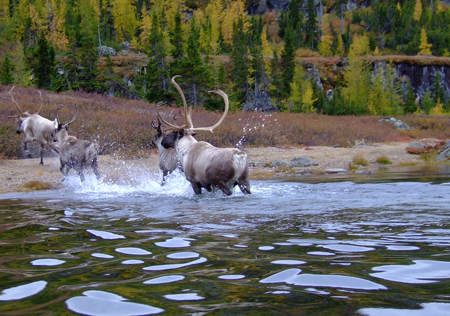
Woodland Caribou
Credit: Valerie Courtois, Canadian Boreal Initiative
I was fortunate to be able to attend the 2010 North American Caribou Workshop in Manitoba back in October. While I’m usually excited to attend any major conference or workshop on an issue near and dear to me such as caribou (birds are of course #1, but I can take off my birding hat on occasion), this one was particularly unique.
Many similar conferences and workshops often feel highly academic and borderline mechanical, consisting of lectures dominated by statistical findings and analysis. This isn’t to say that those meetings don’t excite me, but this one was special. Not only was the number of attendees far larger than previous sessions (more than 400 compared to typically less than 200), but the underlying theme and structure was far different than perhaps any major workshop I’ve attended before.
Aboriginal peoples of the north, who typically live in the remote regions we often study, have too infrequently been given the chance to share their knowledge and understanding of a wide variety of environmental issues – caribou being no exception. Despite having long relationships with caribou and centuries of passed down knowledge, their voice is often lost in policy discussions usually dominated by scientific method and analysis.
This year there were numerous lectures and discussions led by Aboriginal representatives. Some of these discussions even mixed up the traditional academic meeting type seating arrangement: some discussion leaders chose to rearrange the chairs into a circle to better create flow in the dialogue and symbolize equality of opinion. The result was an insightful merging of two traditionally different modes of thinking. Scientific explanations of things like reproductive health may have provided better insight to some of the Aboriginal representatives, whereas longer historical timelines of things like population and range fluxes and external environmental events in some of the more regional areas added better context to and explanation behind more recent declines in herd populations for Western scientists.
Overall it was an amazing experience and I feel blessed to have been given the opportunity to attend. It started a new dialogue on protecting caribou, and I hope this sort of perspective sharing continues – not just on caribou, but on many of the other environmental concerns we have up north.
I was also fortunate to be invited to share some of my experiences and perspectives on caribou with National Geographic News, which I did in a guest column you can view below:
The workshop and the new dialogue was also covered in the major Canadian magazine Maclean’s, as well as on the radio program Native America Calling.

